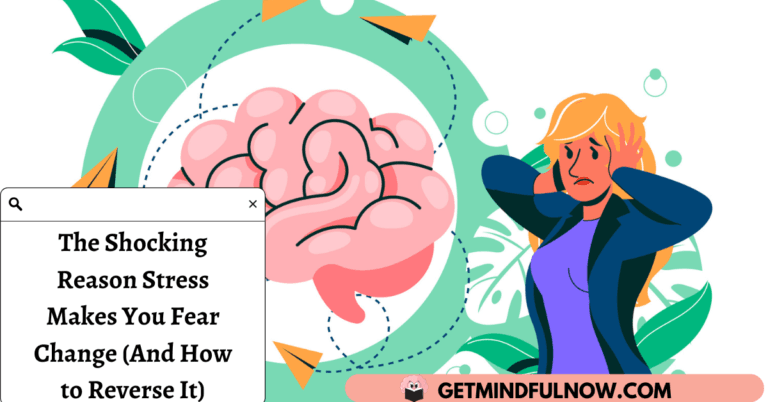Have you ever felt like life used to be more exciting, but now you just want to stick to your routine? Maybe you used to love learning new things, but now even small changes feel overwhelming. You’re not alone, this shift in behavior isn’t just about age or personality. It’s your brain, quite literally, changing in response to stress.
But here’s the real question: What if your brain was never designed to fear change, but stress reprogrammed it to?
Science shows that chronic stress physically alters the brain, making us crave familiarity instead of adventure. We’re not just tired, we’re wired for repetition. And the worst part? This cycle can make us feel stuck, uninspired, and even unhappy without realizing why.
Let’s explore why chronic stress makes us crave routine over novelty and why that’s a problem. More importantly, let’s talk about how we can reverse it.
The Stress-Hippocampus Connection: When Your Learning Brain Shuts Down
The hippocampus is a small but mighty part of the brain responsible for forming new memories and helping us learn new things. It’s like your internal library, constantly storing and organizing information. But this library has a weakness—it’s highly sensitive to stress.
Research shows that when we experience chronic stress, our body releases high levels of cortisol, the primary stress hormone. While cortisol is necessary in short bursts (like when we need to react quickly in a dangerous situation), prolonged exposure to it becomes harmful. Multiple studies confirm that excess cortisol shrinks the hippocampus, reducing its ability to create new neurons and impairing memory.
A 1998 study by Sapolsky et al. found that prolonged stress leads to hippocampal atrophy (cell degeneration) in both animals and humans. More recent research in 2023, published in Frontiers in Aging Neuroscience, reaffirmed that high cortisol levels are linked to poor memory and cognitive decline. This is why people under chronic stress often experience forgetfulness or difficulty learning new things.
But here’s the shocking part: when your hippocampus weakens, it also affects your desire for novelty. The neurological machinery that makes us curious, that makes us seek out new experiences, is directly tied to a healthy hippocampus. When that system weakens, we stop craving newness and instead prefer predictability.
This has been demonstrated in animal studies as well. A study on rats found that those with hippocampal damage stopped exploring new toys or novel objects placed in their cage, whereas rats with a healthy hippocampus showed a natural curiosity for new experiences. This suggests that the hippocampus is directly responsible for our drive to seek out and engage with new stimuli—when it deteriorates, so does our desire for exploration.
Why Do We Start Hating Change? The Brain’s Shift to Routine
Have you ever wondered why some people love challenges while others avoid them? Why some embrace change while others stick to what they know? It turns out, our response to novelty isn’t just about personality—it’s about how our brain adapts to stress.
When the hippocampus weakens, another brain region takes over: the basal ganglia. This is the part of the brain responsible for habitual behavior and repetitive actions. It’s great when we’re trying to automate things like brushing our teeth or driving to work. But when the basal ganglia become dominant due to a weakened hippocampus, we start defaulting to routine in all areas of life—not just necessary habits.
This shift means we:
- Stick to the same routine, even if it’s unfulfilling
- Avoid learning new things because it feels mentally exhausting
- Resist changes in our environment, relationships, and work
- Prefer autopilot over creativity and innovation
Essentially, stress tricks our brain into believing “new” is dangerous. And when we stop engaging with new experiences, our world shrinks.
How Stress Silences the Neocortex—The Brain’s CEO
The neocortex is the most evolved part of our brain, responsible for higher-order thinking, creativity, and decision-making. When we’re calm and curious, the neocortex is in charge. We analyze, dream big, and create solutions.
But when we’re stressed, the brain’s control shifts. The amygdala (our fear center) takes over, and the neocortex gets suppressed. This means:
- We become more reactive, less thoughtful
- Our ability to plan ahead diminishes
- We default to what feels familiar
This is why chronic stress doesn’t just make us crave routine—it makes us fearful of change. The neocortex loses power, and the primitive brain takes over, making us feel like we must “play it safe” instead of taking risks.
Breaking Free: How to Rewire Your Brain for Novelty and Growth
The good news? The brain is incredibly adaptable. Just as stress rewires it for routine, we can rewire it back for curiosity and expansion. Here’s how:
1. Reduce Cortisol with Daily Relaxation Practices
Since high cortisol is the main culprit, the first step is lowering stress. Science-backed methods include:
- Meditation & breathwork: Dr. Joe Dispenza’s research shows that meditation can reverse hippocampal atrophy and increase neuroplasticity.
- Physical activity: Exercise stimulates BDNF (Brain-Derived Neurotrophic Factor), a protein that promotes the growth of new neurons in the hippocampus.
- Quality sleep: Sleep flushes out stress hormones and repairs brain cells.
2. Meditation with Elevated Emotions and the Reticular Activating System (RAS)
Meditation is one of the most powerful ways to rewire the brain, especially when combined with elevated emotions like gratitude, love, and joy. When we intentionally generate these emotions, our brain releases dopamine and oxytocin, helping to rebuild the hippocampus and rewire the stress response.
The Reticular Activating System (RAS), a network in the brainstem, plays a crucial role in attention and focus. When we are in a stressed state, the RAS filters out new opportunities and keeps us locked in familiar patterns. However, by meditating on positive possibilities and visualizing desired changes, we can train the RAS to notice new opportunities instead of threats.
To practice this, try:
- Close your eyes and breathe deeply.
- Visualize yourself thriving in a new, exciting situation. Feel the emotions of joy and excitement as if it’s already happening.
- Express gratitude. Gratitude amplifies positive neurochemical changes and retrains the brain to look for opportunities instead of dangers.
- Repeat daily. The more consistently you do this, the more you activate neuroplasticity and reshape your experience of reality.
3. Strengthen the Neocortex with Mindful Thinking
- Practice decision-making: Instead of defaulting to habit, take a moment to consciously think about your choices.
- Engage in deep thinking activities: Reading, journaling, and problem-solving all strengthen the neocortex and help reclaim cognitive control.
- Challenge automatic fears: Whenever change feels scary, ask yourself, Is this a real threat, or is it just my stress-wired brain talking?
Final Thoughts: Wake Up Your Inner Explorer
If you feel stuck in the same routines, exhausted by change, and uninspired by life, your brain is likely operating on autopilot due to stress. But the best part about neuroplasticity is that you can change this.
We were never meant to live in fear of the new. Our brains are wired for growth, learning, and adventure. It’s time to reclaim that curiosity.
So, here’s my challenge for you: What’s one new thing you can do today to wake up your brain?
Let’s rewire for curiosity—one small change at a time. 🚀








